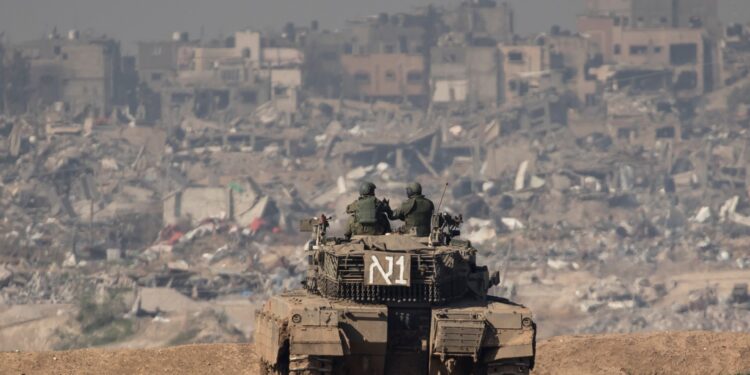6/9/2024–|Last update: 6/9/202405:48 PM (Makkah Time)
After 11 months of war, Israel is facing its biggest economic challenge in years. Data shows that Israel’s economy is experiencing the sharpest slowdown among the richest countries in the Organization for Economic Cooperation and Development, according to a report published by The Conversation website.
According to the site, the gross domestic product contracted by 4.1% in the weeks following the massive attack led by the Islamic Resistance Movement (Hamas) on October 7, while the decline continued until 2024, as it decreased by an additional 1.1% and 1.4% in the first two quarters.
According to the site, the situation was no better with a general strike on September 1, which brought the country’s economy to a halt – albeit briefly – amid widespread public anger over the government’s handling of the war.
Israel’s economic challenges pale in comparison to the total destruction of Gaza’s economy, but the prolonged war continues to damage Israeli finances, business investments, and consumer confidence, according to The Conversation.
Israel’s economy was growing rapidly before the war began, driven largely by the technology sector, while the country’s annual per capita GDP rose by 6.8% in 2021 and 4.8% in 2022, far higher than most Western countries.
But things have changed dramatically since then, the same source said. In its July 2024 forecast, the Bank of Israel revised its growth forecast to 1.5% for 2024, down from the 2.8% it had forecast earlier in the year.
With no sign of a halt to the war in Gaza, and the confrontation with Hezbollah on the Lebanese border intensifying, the Bank of Israel estimates that the cost of the war will reach $67 billion by 2025.
Even with a $14.5 billion military aid package from the United States, Israel’s finances may not be enough to cover these expenses, The Conversation said.
hard choices
The site notes that this means that Israel will face difficult choices regarding how to allocate its resources. It may, for example, have to cut spending in some areas of the economy or take on more debt. More borrowing will lead to higher loan payments and higher costs of servicing them in the future.
Israel’s deteriorating financial situation has prompted major credit rating agencies to downgrade Tel Aviv. Fitch downgraded Israel’s credit rating from A+ to A in August on the grounds that its increased military spending has contributed to a widening of the fiscal deficit to 7.8% of GDP in 2024, up from 4.1% the previous year.
All of this would also jeopardize Israel’s ability to maintain its current military strategy, according to The Conversation. This strategy, which includes ongoing operations in Gaza aimed at destroying Hamas, requires ground forces, advanced weapons, and ongoing logistical support, all of which come at a huge financial cost.
Beyond macroeconomic indicators, The Conversation says the war has had a profound impact on specific sectors of the Israeli economy. The construction sector, for example, slowed by about a third in the first two months of the war. The agricultural sector has also been hit, with production falling by about a quarter in some areas.
Some 360,000 reservists were called up at the start of the war, although many have since returned home. More than 120,000 Israelis were forced to leave their homes in border areas. 140,000 Palestinian workers from the West Bank have not been allowed to enter Israel since the outbreak of the war.
The Israeli government has sought to fill this gap by bringing in workers from India and Sri Lanka. But many key jobs are sure to remain unfilled.
It is estimated that up to 60,000 Israeli companies may be forced to close in 2024 due to staff shortages, supply chain disruptions and declining business confidence, while many companies are postponing new projects.
Tourism, although not a major part of Israel’s economy, has been hit hard. Tourist numbers have dropped dramatically since the war began, with one in 10 hotels across the country facing the prospect of closing.
Wider effects of war
The war may have badly damaged the Israeli economy, but its impact on the Palestinian economy was much worse, and will take years to repair, according to The Conversation.
Many Palestinians living in the West Bank have lost their jobs in Israel, and Israel’s decision to withhold most of the tax revenues it collects on behalf of the Palestinians has left the Palestinian Authority cash-strapped.
Trade in Gaza has ground to a halt, meaning many Palestinians are now dependent on aid. At the same time, vital communication channels have been cut off and vital infrastructure destroyed.
The effects of the war have extended beyond Israel and Palestine. In April, the International Monetary Fund said it expected growth in the Middle East to be “lackluster” in 2024, at just 2.6%, citing the uncertainty created by the war in Gaza and the threat of a full-blown regional conflict as a reason, The Conversation reports.
The site concludes by emphasizing that Israel’s war on Gaza, which is fast approaching its first anniversary, is causing massive economic losses. Only a permanent ceasefire will be able to repair the damage and pave the way for recovery in Israel, Palestine, and the wider region.



